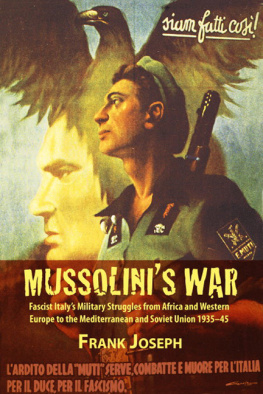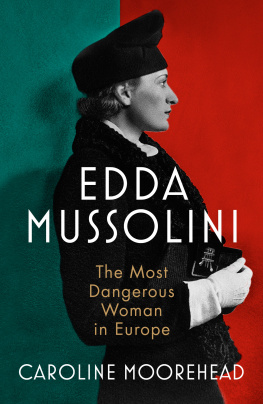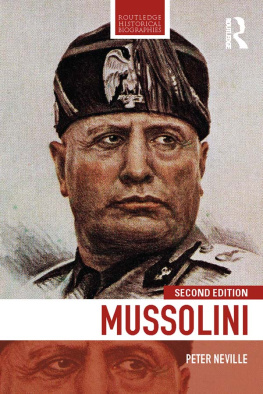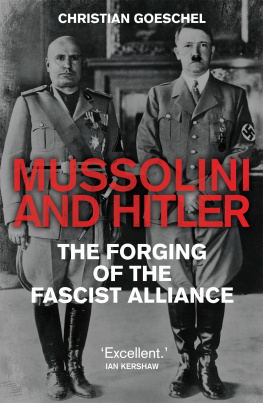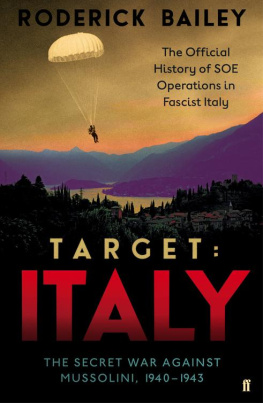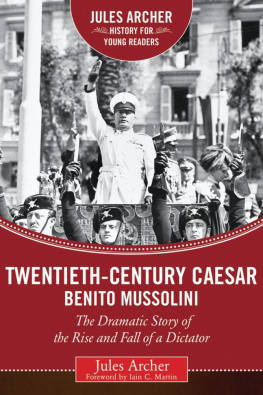
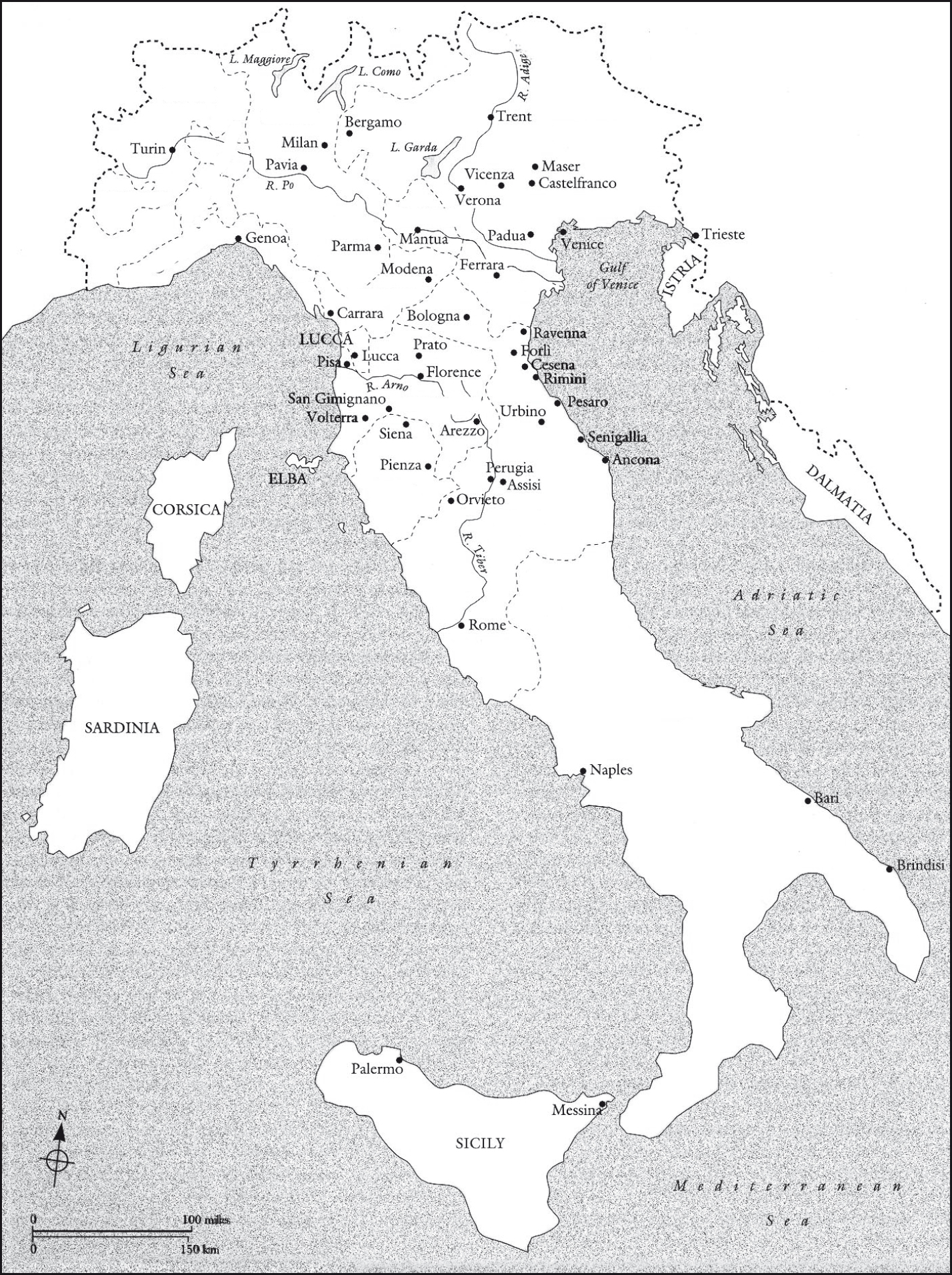
Map of Italy

Helion & Company Limited
26 Willow Road
Solihull
West Midlands
B91 1UE
England
Tel. 0121 705 3393
Fax 0121 711 4075
Email: info@helion.co.uk
Website: www.helion.co.uk
Published by Helion & Company 2010
Designed and typeset by Farr out Publications, Wokingham, Berkshire
Cover designed by Farr out Publications, Wokingham, Berkshire
Printed by The Cromwell Press Group, Trowbridge, Wiltshire
Frank Joseph 2009
All photographs from the authors collection except for photograph of Mussolini on rear cover Bundesarchiv (101I-316-1181-11). Maps retrieved from public access sources and amended by Farr out Publications.
ISBN 978 1 906033 56 9
eISBN 9781907677519
British Library Cataloguing-in-Publication Data.
A catalogue record for this book is available from the British Library.
All rights reserved. No part of this publication may be reproduced, stored in a retrieval system, or transmitted, in any form, or by any means, electronic, mechanical, photocopying, recording or otherwise, without the express written consent of Helion & Company Limited.
For details of other military history titles published by Helion & Company Limited contact the above address, or visit our website: http://www.helion.co.uk.
We always welcome receiving book proposals from prospective authors.
CONTENTS
Foreword
F rank Joseph has asked me to write a forward for his new book, Mussolinis War . I am certainly most happy to do so. Although I am not an academic or military historian, as a former U.S. Marine who enlisted in 1964 and retired in 1992, I certainly have an interest all things military. And this book is right up my alley. It is packed with military minutia, but written in such a way that it reads like an action novel. The authors extraordinary gift for original research and the ability to weave detailed accounts into readable works is exceptional.
He is a gifted researcher, and pulls most of his information from source documents. By doing so, those who think they know World War Two history will be pleasantly surprised to learn an incredible array of new details about the entire scope of that conflict, and not just as it related to Italy. And I guarantee that it will completely change general, preconceived notions of the Second World War. It certainly changed mine. A great read!
Forrest P. Patton
Lieutenant Colonel, United States Marine Corps Reserve (Ret.)
Introduction
The First Casualty of War
Words are indeed splendid things. But rifles, machine-guns, ships, airplanes and cannons are even more splendid. Right remains an empty word, if it is not backed by power, and your great countryman, Niccolo Machiavelli, has predicted that unarmed prophets will perish.
Benito Mussolini, Florence, May 1935
A ccording to Ernle Bradford in his Siege: Malta, 1940-1943 , The stories of (Italian) cowardice carried in the British press, like all things else in wartime, were designed for home consumption by civilians.
Mussolinis War belongs to these multiplying reassessments, but differs from them in that it does not focus on a single campaign or theater, but for the first time attempts to encompass the entire conflict from the perspective of Italys true role in the fighting. In so doing, its fresh examination of the Italian military in North Africa, on the Eastern Front, in the air and at sea, reveals a story radically at odds from standard assumptions about the Duce and his men, unknown to most readers, particularly outside Italy. Forgotten, too, are Italian achievements in aircraft production, such as her Veltro , or Greyhound, equal to the best Allied fighters, and so admired by Luftwaffe top brass they equipped an entire Gruppe with the swift airplane.
However, Mussolinis War does not attempt to sanitize the memory of a man capable of waging modern warfare on pre-literate East Africans. Since 1945, countless published biographies and film documentaries have enumerated this and many other morally reprehensible acts associated with 20th Centurys Italys most infamous son. The present investigation will not re-hash his all-too-familiar reputation as a murderous bully, but endeavor to separate it from his abilities as a dux bellorum, or Roman war chief, which gave birth to his popular title, Il Duce . In so doing, the real performance of his troops stands forth.
Unfortunately, their remarkable military record is still obscured by historical exaggeration. Even dispassionate researchers interested only in the truth continue to view Italys role during World War Two through the distorted lens of Mussolinis despised ideology. Instead, this history strives to illuminate him, not from a 21st Century perspective, but within the context of the crucial times he lived in and impacted. Today is not yesterday. A world died in 1945, followed by a new epoch, ours, with which it had little morally in common. The wholesale gassing of African tribesmen by European imperialists, now an unthinkable atrocity, was hypocritically criticized at the time as a kind of embarrassment to the League of Nations, whose own member-nations had gassed many more thousands of British, French and Germans on the Western Front, just seventeen years earlier. There are two sides to every story, even Mussolinis story.

Adolf Hitler and Benito Mussolini appear together at the balcony of the Palazzio Venezia in May 1938.
His perceived political or moral failings are the kind of issues largely left to other investigators by this examination in its determination to discover the real nature of Italys participation in the Second World War. Even students already familiar with that monumental conflict will be surprised to learn how the British Royal Navy was defeated and driven from the Central Mediterranean; or how, on 7 June 1942, infantry of the Italian X Corps saved Rommels 15th Brigade near Gazala, in North Africa, from otherwise certain annihilation.
No less remarkable was historys last, victorious cavalry charge undertaken by Italian horse-soldiers on the Eastern Front, or Mussolinis incredibly successful offensive against the Americans before the final curtain of the Italian theater in World War Two. Far more unfamiliar were Italian plans to attack New York City, Winstons Churchills secret, wartime correspondence with the Duce , and Italys own atomic bomb project.
Mussolinis War describes what actually happened from the blazing tank battles of North Africa and the desperate fight for control of the Mediterranean Sea, to the blood-stained snows of the Eastern Front. Here, too, is the real account of Mussolinis death, and how an Italian submarine scored the concluding Axis victory of the Second World War. Most startling of all is how remarkably close he came to overcoming the Allies. During several pivotal crises, his forces were within a hairs breadth of winning the war. In these fleeting moments of truth, he held the key to final victory. How he lost it is the question posed by this investigation.

